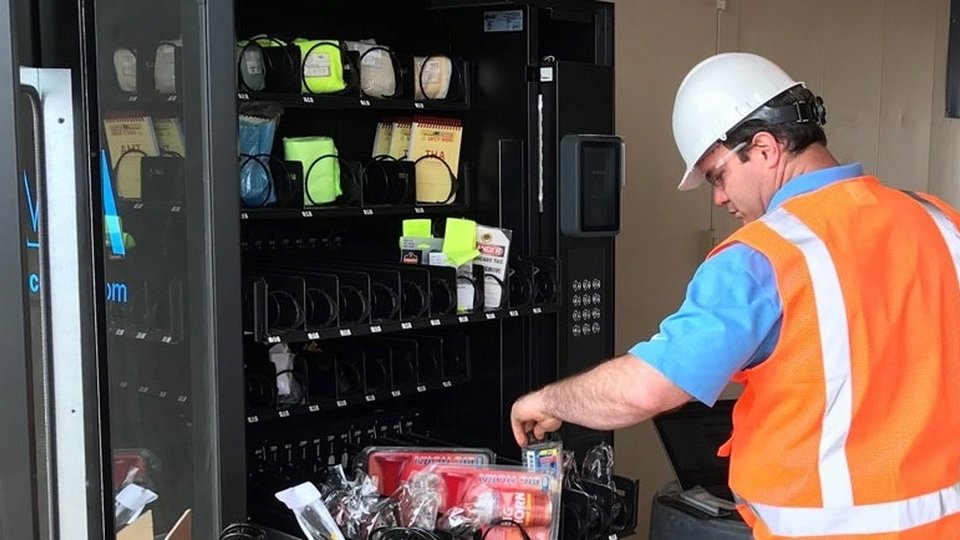Commentary
Industrial supply vending: Why the surge shows no signs of letting up
The pandemic and supply chain disruptions have accelerated the need for effective inventory visibility for industrial supply distributors. Vending and inventory control software help customers achieve greater inventory visibility and more precise ordering.

June 20, 2022 by Mark Hill — Founder, 1sourcevend
Industrial supply vending has become a big business in recent years with no signs of slowing. A report by Grand View Research forecasts the market to grow to over $4.6 billion by 2027.
Industrial supply distributors can no longer ignore customers' demand for point-of-use inventory solutions like vending as more and more small- to mid-size enterprises and manufacturing facilities expect these value-added services from their distributor partners.
Here's why. Inventory management on MRO (maintenance repair and operations) and industrial supplies has always been a critical function in manufacturing and production operations, but the recent pandemic and subsequent supply chain disruptions have accelerated the need for effective inventory visibility. Many businesses struggle with inventory control and overspend thousands every year on supply costs, resulting in:
1. Excess inventory tying up capital that could be invested elsewhere.
2. Employees hoarding items for fear of running out of mission-critical supplies.
3. Employees wasting time looking for misplaced inventory.
4. Missing inventory halting production, leading to expensive spot buys.
Ineffective inventory control and strained supply chain activity have become a major driver in rising supply costs for distributors and their customers. So much so, that according to an article in Reliable Plant magazine, 82% of senior manufacturing executives reported that inventory reduction was a major concern for them and would like to refocus that money into other initiatives including new product development, marketing, acquisitions, modernization and more.
Despite this, some distributors remain resistant when it comes to implementing vending solutions for their customers. Many focus on the cost of the unit itself and ask questions like:
- "How much is this going to cost me?"
- "Will I recoup my investment?"
- "Am I going to lose sales?"
Rather than focus on the cost of the unit (which can be more cost-effective than some realize), industrial supply distributors should focus on the ways vending can solidify existing customer relationships and open the door to new opportunities. When customers struggle with rising supply costs or supply inefficiencies interrupt production schedules, their profitability is threatened.
Subsequently, customers begin to evaluate their supply partners and ask: Who helped them in their time of need? Who helped them solve their inventory challenges? Who didn't?
One way to help customers overcome these obstacles is to offer innovative solutions like vending that can increase inventory visibility, save them money and give them more control over their supply purchases.
Many distributors can intuitively see the value of vending, but often seek answers to these top two questions: How much does an industrial supply vending machine cost, and how will I recoup my investment.
How much does it cost?
In the past, industrial vending machine options were limited and expensive. Some vending providers still offer vending machines that cost over $20,000, but more expensive does not mean better. Some of today's vending machines have modest price points starting around $6,000 and are easy to install, easy to maintain and easy to use. Some things distributors should consider when choosing a vending provider are the features and fees associated with startup and continuation.
Distributors should ask if there are unlisted costs for things like machine rentals, training, service and installation. Regarding inventory management software distributors should find out if there are software leasing costs or fees for functionality upgrades. It pays to know the fine print and exactly what is and isn't included in the initial and total costs.
As for recouping the cost of the investment, vending and inventory control software help distributors' customers achieve their goals through greater inventory visibility, more precise ordering and fewer spot buys, but it also benefits the distributor. Not only can an effective vending program insulate a distributor from competitors, but there are also several other ways distributors can recoup their investments — some almost immediately.
Increased customer stickiness
Research shows that attracting a new customer can cost five times more than retaining an existing one, according to digital consultation firm Invesp. By solving customer problems like inefficient inventory management and excess spend, you can protect your customers from competitors and reduce your churn rate.
Increased customer spend
Some distributors worry that by streamlining their customers' inventory purchases they will lose sales. However, by helping them cut costs and save money through vending, distributors often make significant sales gains in product categories their customers were spending elsewhere.
Labor cost reduction
Once a vending program is implemented and combined with inventory control software, distributors can start to experience labor savings. When a customer's inventory items hit a designated minimum, it triggers a purchase order. This reduces the need for frequent and manual inventory counts and quote generation from the distributor sales team.
Time to develop new business
In addition to labor savings, distributors can reduce manual inventory counts and free up sales reps to pursue new customer accounts or spend that time nurturing existing customers — resulting in larger market share gains.
The competition among manufacturing and other industrial supply distributors is getting tighter and tighter. Industrial vending machines and inventory management software is a growing option helping small to midsize distributors as well as large suppliers.
 ChatGPT
ChatGPT Grok
Grok Perplexity
Perplexity Claude
Claude






